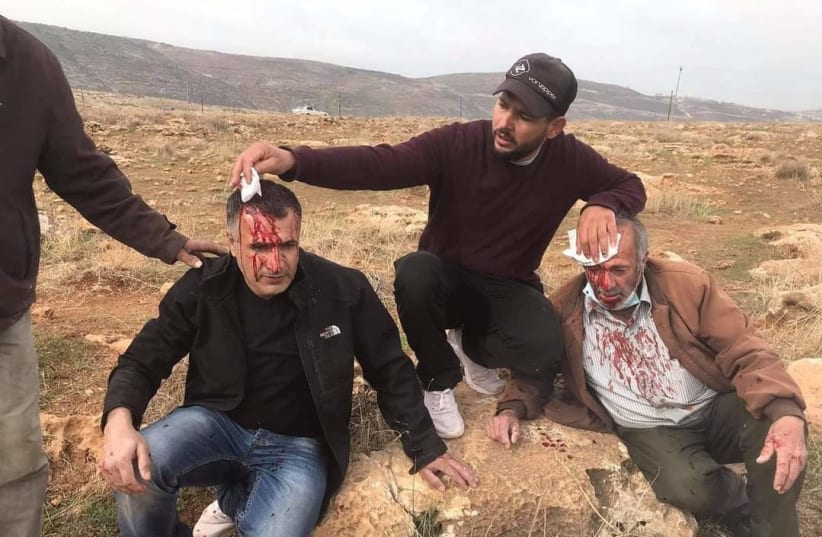A territorial dispute regarding farmland in the Jordan Valley has left a Palestinian farmer and his son injured by settler violence and led to a Palestinian assault on Yesha Council head David Elhayani.
Both incidents occurred amid a spike in West Bank violence, particularly settler attacks against Palestinians, after Ahuvia Sandak, 16, was killed in a car accident while fleeing police on December 21.
The left-wing NGO Yesh Din has reported at least 50 attacks by settlers and Jewish extremists against Palestinians and their property. This has included multiple incidents of stoning attacks against Palestinian vehicles. Many similar stoning attacks have occurred on the sidelines of West Bank protests against police actions with regard to Sandak’s death.
Other incidents of violence such as the two in the Jordan Valley the past week, revolve around territorial disputes.
Residents of the Gitit settlement on Monday, with the support of the Jordan Valley Regional Council, began preparing a new 57 hectare wheat field for planting.
According to Elhayani, who heads both the Jordan Valley Regional Council and the Yesha Council, the land in question is within Gitit’s master plan and as such belongs to the settlement.
Palestinians from the nearby town of Akraba have argued that the land in question belongs to them. Several arrived at the field to protest the plowing, and violence broke out.
Elhayani said that Palestinians attempted to throw stones at the tractor working the field and one of the Palestinians physically attacked him.
Police and army officers who were called to the scene, arrested the attacker.
Akraba Council member Farouq Bani Jaber told the Palestinian news agency WAFA that the Palestinians have documents to prove their land ownership.
The Civil Administration, which was also called in, said the Palestinians had submitted to it ownership documents, adding that it was checking their ownership claim.
On Wednesday a few members of the Gitit settlement resumed work on the field, including a tractor driver and the head of security for the settlement.
According to the Jordan Valley Regional Council they were met by dozens of Palestinians and violence erupted, leaving two Palestinian injured.
Elhayani said that said the two were injured by settlers from the Shomron area, who attacked them with stones and clubs. Jordan Valley Security cameras have identified the perpetrators and that information was given to the police and the army, who had also was called to the scene on Wednesday, he added.
But, according to Yesh Din, farmers were working the land near Gitit when they were attacked by settlers. It said that a 75-year old farmer and his son were injured. The group provided photographs of the two men with head injuries and blood streaming down their faces.
The police said it was investigating both incidents.
Yesh Din Executive Director Lior Amihai said the attack on the farmers was directly connected to the violent attacks against Palestinians his group has been reporting on almost daily.
Amihai charged that the state had abandoned the Palestinians in the West Bank and had allowed “systematic” attacks against them so that it could “advance its political agenda.”
Elhayani said he condemned the violent attack against the Palestinian farmers, noting that such violence “does not conform to Jewish or human values nor to the principles on which the Jordan Valley settlements are based.”
Such violence, he said, harms the “just struggle” of the Jewish farmers in the Jordan Valley to plow their land.
He told The Jerusalem Post that he saw the Palestinian opposition to the plowing by the Gitit farmers and their claim to land ownership as part of the overall battle by Palestinians to seize hold of Area C of the West Bank.
Violence by Jewish extremists and settlers against Palestinians had already been on the rise in the last two years, but Sandak’s death has accelerated it.
According to the office of the United Nations Coordinator for Humanitarian Affairs, there were 341 incidents of Jewish extremist and or settler violence against Palestinians in 2020. Out of those 266 were attacks on property and in another 75 incidents Palestinians were injured. In 2019 there were 298 incidents of Jewish extremist and/or settler violence against Palestinians, of which 219 incidents resulted in property damage and 79 incidents in which Palestinians were injured.
According to WAFA, Jewish extremists and/or settlers entered the West Bank Palestinian town of Turmus Aiya, setting fire to two vehicles and smashing the windows of a third. WAFA also reported that rocks had been thrown at Palestinian vehicles in that same area near the Ramallah-Nablus road.
Separately, well known Israeli left-wing activist Rabbi Arik Ascherman reported that his vehicle had been vandalized, while he was in the West Bank, presumably by settlers and/or Jewish extremists. He said that the bearings of his wheels had been loosened such that the wheels of the vehicle could have come off while he was driving.
He noted the problem shortly after getting on the road. When he stopped to fix the wheels, he said, he was harassed by settlers, including some on horses and one who spat at him.
Violence has not been solely against Palestinians. On December 20, Esther Horgan of the Tal Menashe settlement was killed by a Palestinian for nationalistic motives.
On January 3, Rivka Teitel was hit in the head when Palestinians stoned her car as she drove in the Binyamin Region of the West Bank.
According to the IDF, there were 1,500 stoning incidents against Israelis in the West Bank in 2020 and 229 Molotov Cocktail incidents.
